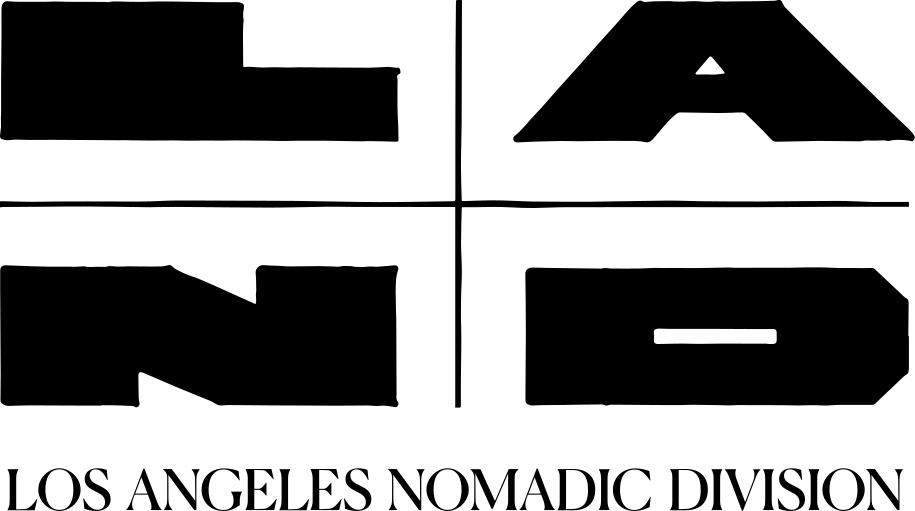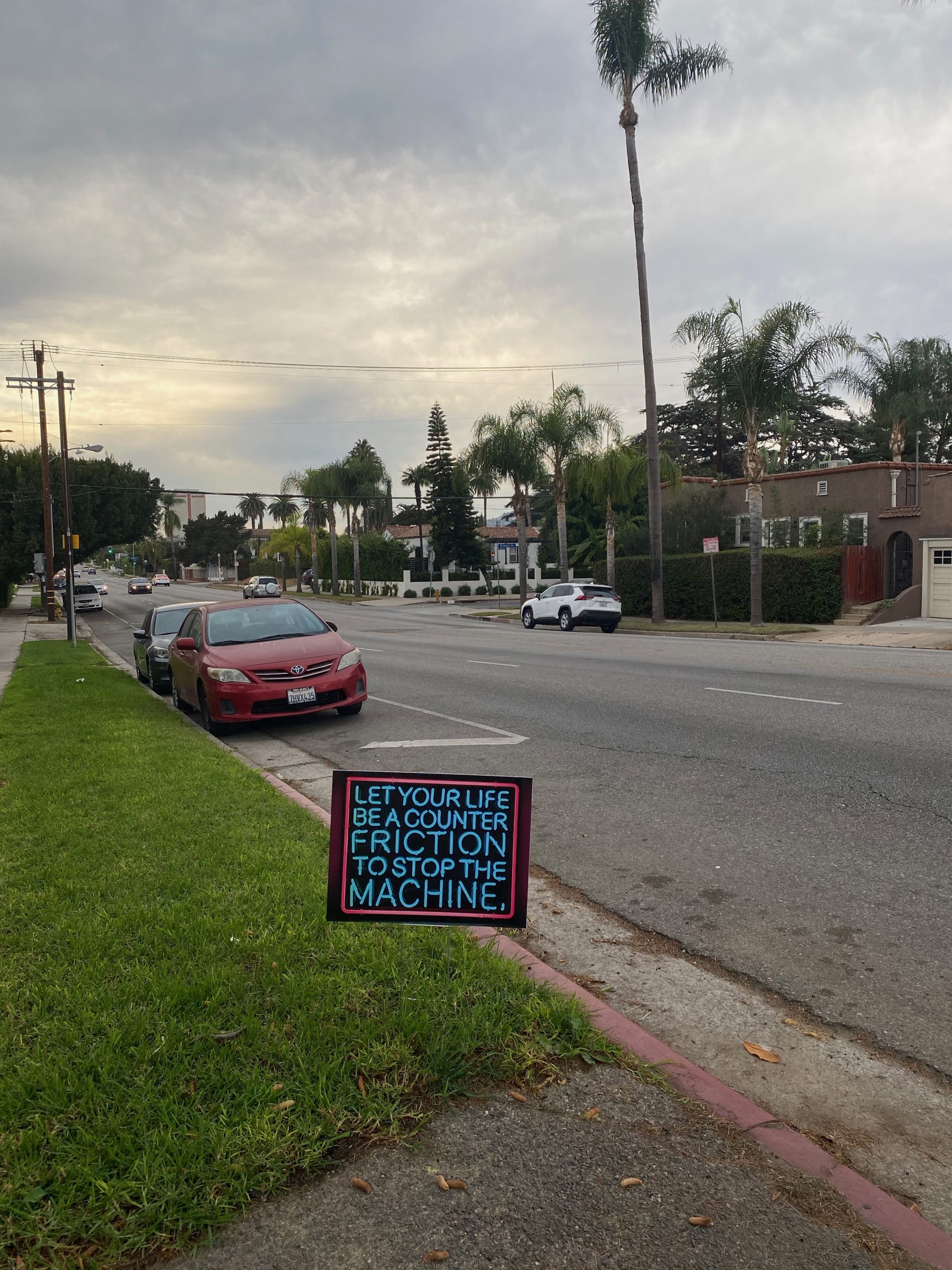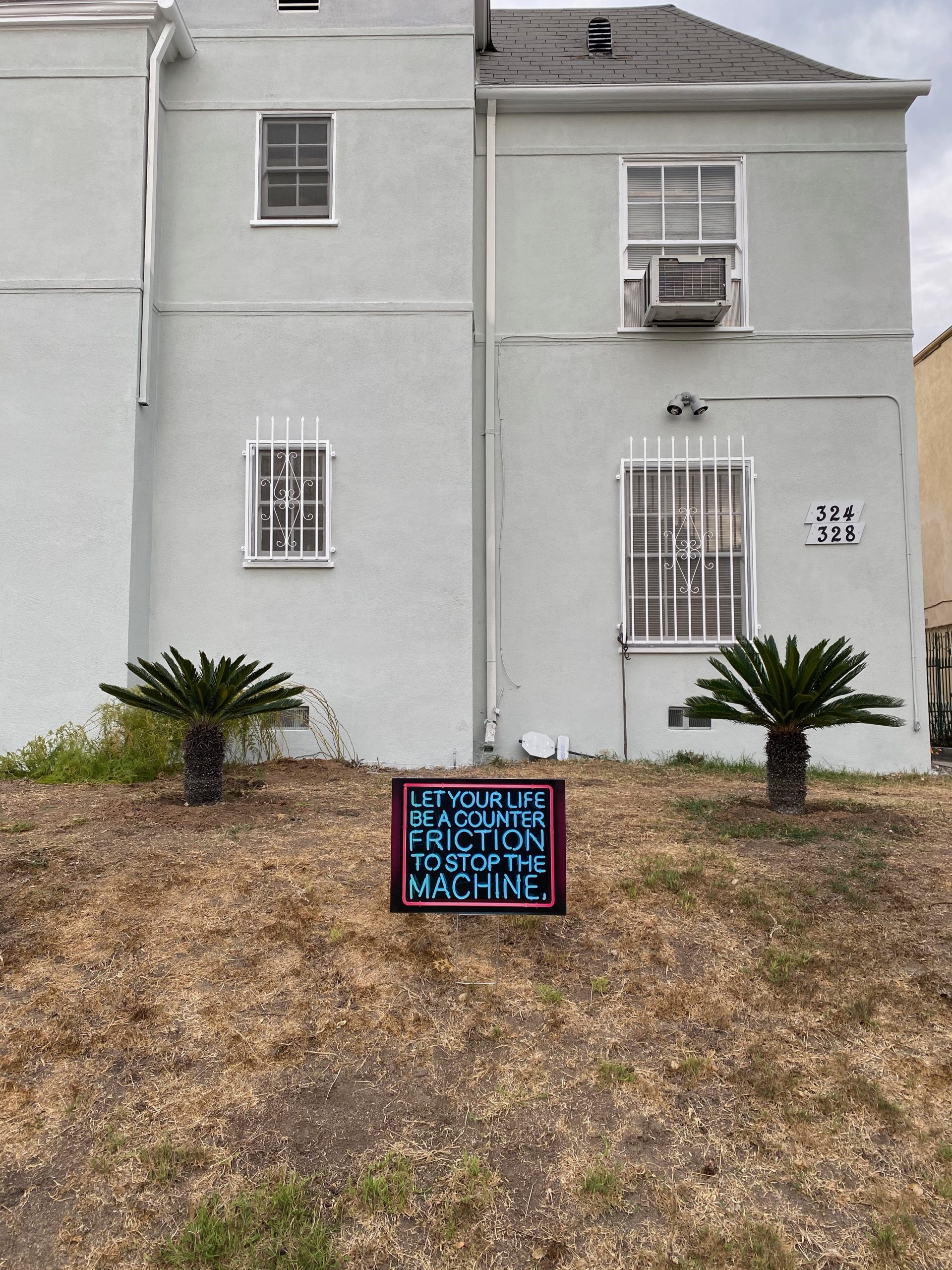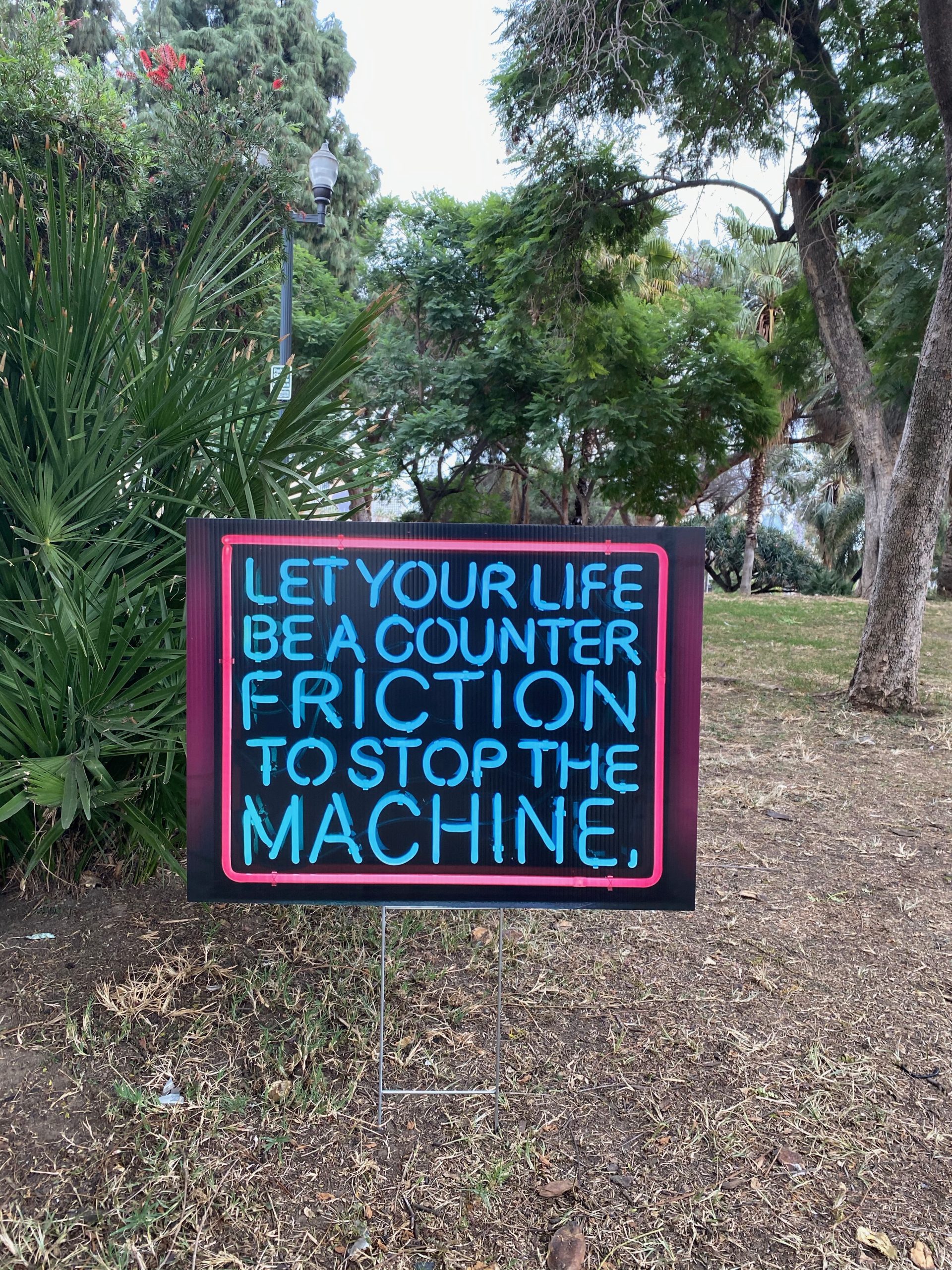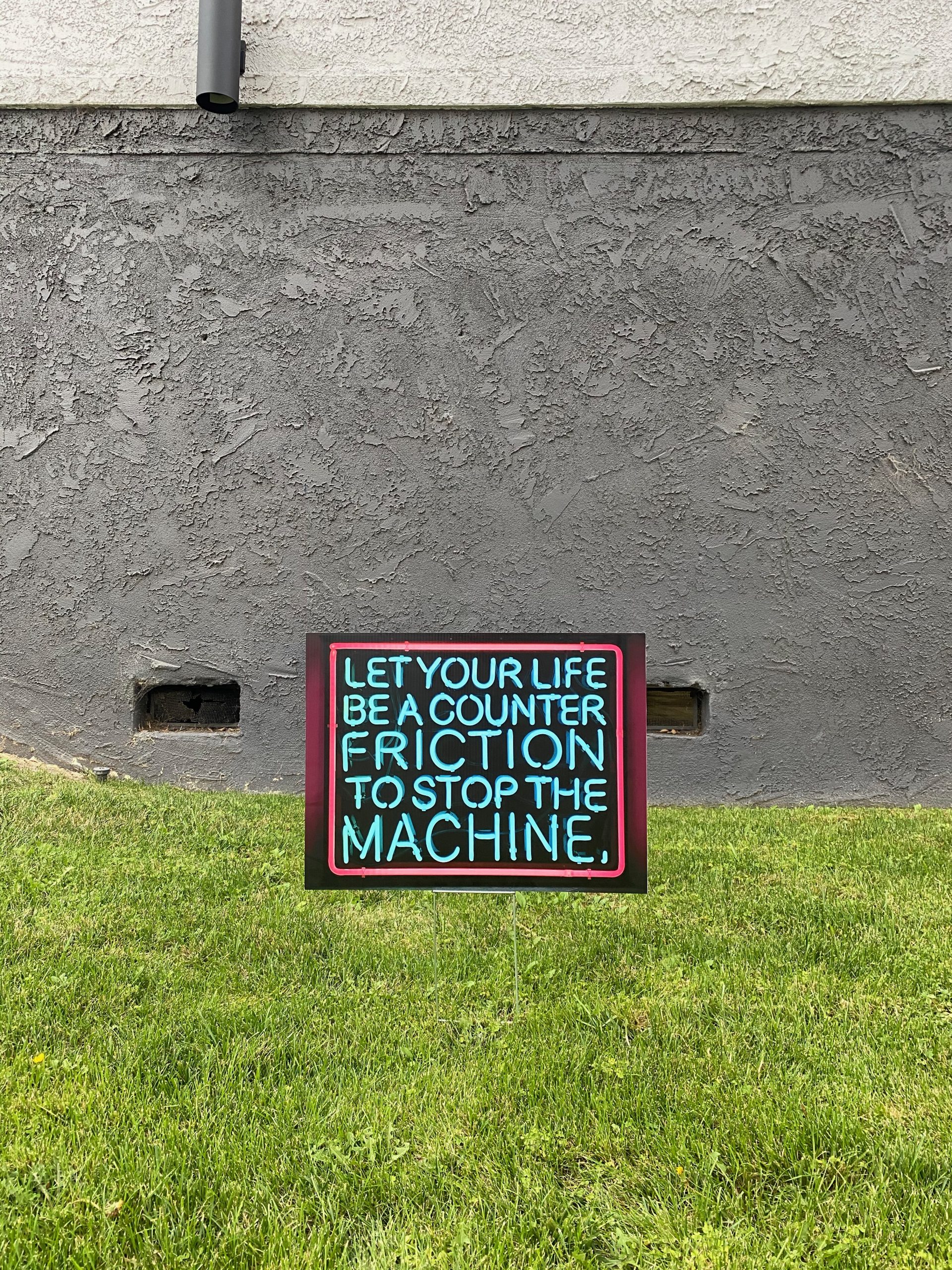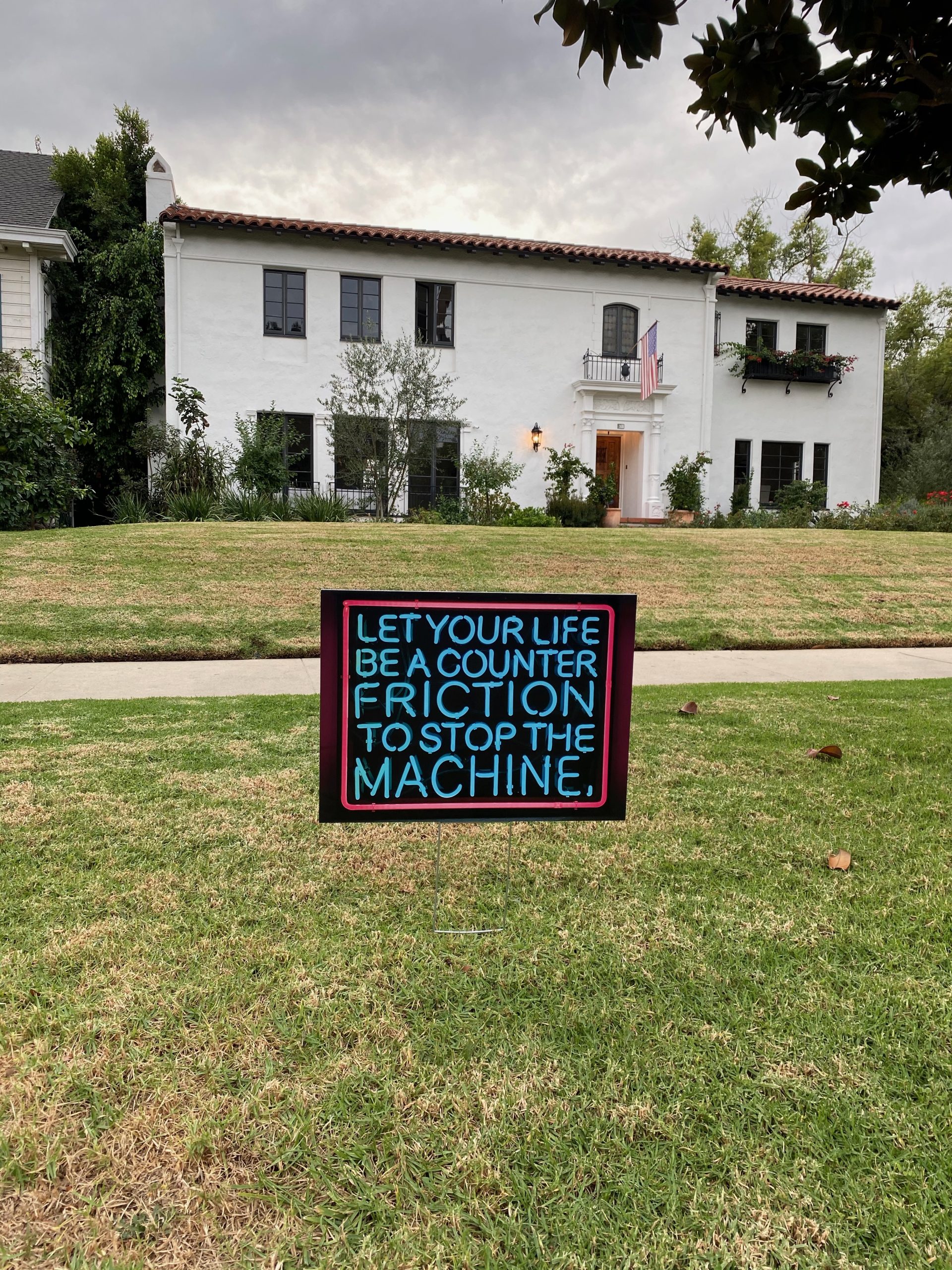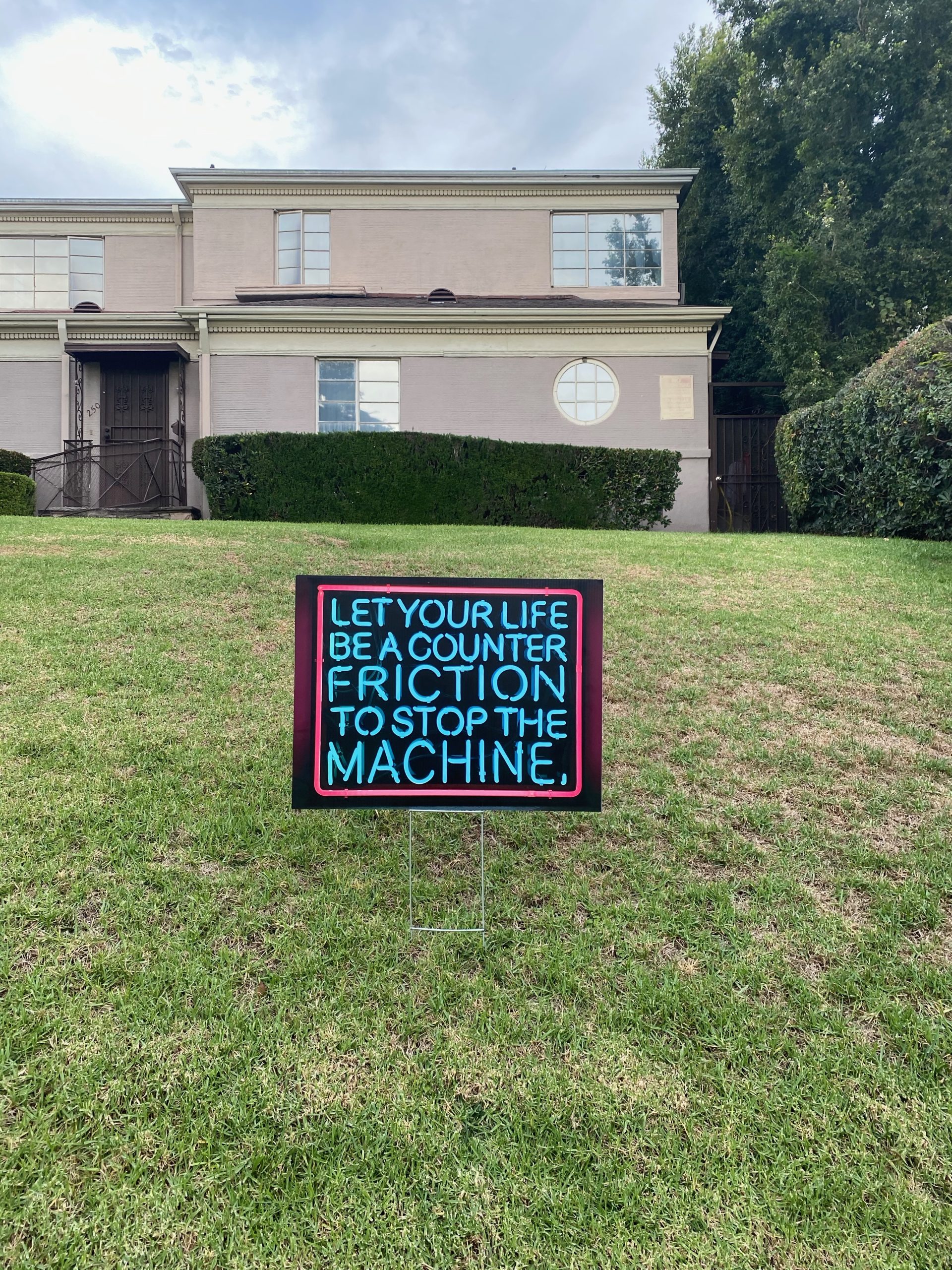
Signs for Change
Following the call for the reimagination of public and civic space, LAND launches Signs For Change, a city-wide public art-initiative that reconsiders the power and influence of symbols, signs, and messages. Signs For Change prompts artists to challenge and speak to civic-institutions in a series of flags, posters, and signs hosted at sites throughout Los Angeles.
Informed by artists’ responses to the ongoing call for equality, Signs For Change follows their lead of making signs that function for public use. The works will be available for wide dissemination, as well as an edition format, with 50% of the proceeds going back to support the sustainability of the project and shared with the artist, and 50% being donated to community-based and social justice-facing organizations of the artist’s choosing.
Signs For Change hopes to engender a new paradigm for civic participation that is artist-driven and collectively executed.
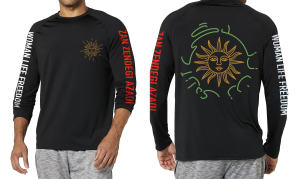
Amir H. Fallah
CHANT T-Shirt
Screen Printed T-shirt
Open edition
$75
50% of proceeds will go to the Omid Foundation and The Center for Human Rights in Iran and 50% of proceeds will go to LAND to sustain the project.
Since September, the world has anxiously watched from afar as protests rage across Iran, ignited by the brutal murder of Jina (Mahsa) Amini at the hands of the Islamic Republic’s morality police. A young woman ultimately lost her life for the absurd crime of having her hair “improperly” covered, a profoundly disturbing affront to the universal human rights of personal autonomy and free expression. This act is not the first instance of oppressive violence in Iran. In the decades since its inception, the Islamic Republic has ceaselessly committed atrocities against the Iranian people, free from accountability – until now.
As part of LAND’s ongoing project, Signs for Change, and in partnership with artist Amir H. Fallah, LAND has commissioned a wearable artwork to raise awareness and funds for two human rights organizations: Omid Foundation and The Center for Human Rights In Iran. The T-shirt is launching alongside a large-scale public sculpture, CHANT, prominently displayed on La Brea Avenue (LA Brea/Melrose avenue intersection) in the heart of Hollywood at Shulamit Nazarian Gallery.
These projects aim to draw continued attention to the ongoing protests demanding human rights in Iran, in solidarity with these movements . Signage and bold messaging are crucial tools in the project of change. CHANT is part of the greater effort to keep this movement alive in our communities worldwide. First and foremost, this project is a tool for public education, joining the demand for urgent change in Iran, using the power of art to elevate the dialogue and keep it in the public eye. This artwork is meant to garner attention, sparking press coverage and encouraging continued direct action. CHANT is a visual statement that will help serve as a beacon for all those united in the struggle for freedom.
CHANT carries the rallying cry of the movement “WOMAN. LIFE. FREEDOM.” in the colors of the Iranian flag, distilling our anger into a demand that can and must be met. Written in English, Farsi, and the phonetic Farsi, these translations are important to diasporic Iranians whose relationship with the written language is in the phonetic form. The sun in the center of the piece carries great symbolic weight during such a pivotal moment for the future of the Iranian people, representing a universal light and a beacon of change and positive growth. Moreover, this symbol of a humanized sun, especially with feminine features, is ancient and prevalent throughout Iranian culture.
About the Artist
Amir H. Fallah received his BFA in Fine Art & Painting at the Maryland Institute College of Art and his MFA in painting at the University of California, Los Angeles. He has exhibited extensively in solo and group exhibitions across the United States and abroad. Selected solo exhibitions include The Fowler Museum, UCLA, Los Angeles; the Museum of Contemporary Art in Tucson; South Dakota Art Museum, Brookings SD; Schneider Museum of Art, Ashland OR; San Diego ICA; and the Nerman Museum of Contemporary Art, Overland KS. In 2009, the artist was chosen to participate in the 9th Sharjah Biennial. In 2015, Fallah received the Joan Mitchell Foundation Painters and Sculptors Grant. In 2019, Fallah’s painting Calling On The Past received the Northern Trust Purchase Prize at EXPO Chicago. In 2020, Fallah was awarded the COLA Individual Artist Fellowship and the Artadia grant. In addition, the artist had a solo exhibition at the Museum of Contemporary Art, Tucson, accompanied by a catalogue, and a year-long installation at the ICA San Jose.
The artist has works in the permanent collections of the Los Angeles County Museum of Art, Los Angeles; de Young Museum, San Francisco; Albright Knox Museum, Buffalo; Birmingham Museum of Art, Alabama; Jorge M. Pérez Collection, Miami; Deste Foundation For Contemporary Art, Athens, Greece; Xiao Museum Of Contemporary Art, Rizhao, China; McEvoy Foundation For The Arts, San Francisco; Nerman Museum, Kansas City; SMART Museum of Art at the University of Chicago; Davis Museum, Massachusetts; The Microsoft Collection, Washington; Plattsburg State Art Museum, NY; Cerritos College Public Art Collection, CA; Los Angeles County Department of Arts & Culture, CA; and Salsali Private Museum, Dubai, UAE.
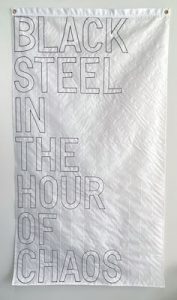
Rirkrit Tiravanija
BLACK STEEL IN THE HOUR OF CHAOS, 2020
Single-sided nylon applique flag with brass eyelets, 36 x 60 inches
Edition of 10, 2 AP
$5,000
Email info@nomadicdivision.org to purchase
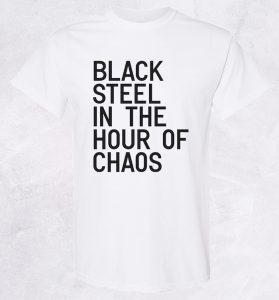
Rirkrit Tiravanija
BLACK STEEL IN THE HOUR OF CHAOS T-Shirt
Screen Printed T-shirt
Open edition
$45
50% of proceeds will go to the Los Angeles Regional Food Bank and 50% of proceeds will go to LAND to sustain the project.
Rirkrit Tiravanija’s Signs for Change flag with LAND features the outlined words “BLACK STEEL IN THE HOUR OF CHAOS” over an all white American flag. The text references Public Enemy’s 1988 song Black Steel In The Hour Of Chaos. Tiravanija’s text-based works, which he describes as “road signs,” invite us to consider how and what messages reach our consciousness on a daily basis. The force of the words encapsulate the foundational shifts that occurred over the past year.
For Signs For Change, Tiravanija chose to benefit the Los Angeles Regional Food Bank, who since 1973, has worked to mobilize resources in the community to alleviate hunger.
Rirkrit Tiravanija was born in Buenos Aires in 1961 and was raised in Thailand, Ethiopia, and Canada. He studied at the Ontario College of Art in Toronto (1980–84), Banff Center School of Fine Arts (1984), School of the Art Institute of Chicago (1984–86), and Whitney Independent Studies Program in New York (1985–86). Since the 1990s, Tiravanija has aligned his artistic production with an ethic of social engagement, often inviting viewers to inhabit and activate his work. In one of his best-known series, begun with pad thai (1990) at the Paula Allen Gallery in New York, Tiravanija rejected traditional art objects altogether and instead cooked and served food for exhibition visitors. Over the following years, the artist ignored the prescribed division between art and life, constructing communal environments that offer a playful alternative venue for quotidian activities. His engagement with propaganda can be seen in his ongoing series of commissioned drawings derived from newspaper images. For his ongoing project The Land (begun in 1998), a collaborative artistic, architectural, and environmental recovery project in Sanpatong, Thailand, residents and artists are welcomed to use a plot of land as a laboratory for development‚ cultivating rice, building sustainable houses, or channeling solar power.
Recent projects and solo exhibitions include: Traversée, Poitiers, France (2019); Hirshhorn Smithsonian Museum, Washington DC, USA (2019); Chaos Omotesando, Tokyo, and Fondation Luma in Arles, France (2018); The NG Teng Fong Roof Garden Commission: Rirkrit Tiravanija, National Gallery, Singapore (2018); untitled 2017 (fear eats the soul) (white flag), Creative Time, (2018); and All the world’s futures, La 56e Biennale di Venezia, Arsenale Artiglierie, Venice (2015). More solo exhibitions include Musée d’art moderne de la Ville de Paris (2005); Los Angeles County Museum of Art (1999); Philadelphia Museum of Art (1998); Museum of Modern Art, New York (1997); and Reiña Sofia, Madrid (1994).
Tiravanija’s work has also been included in major exhibitions such as the Solomon R. Guggenheim Museum in New York (2008); São Paulo Biennial (2006); Liverpool Biennial (2002 and 2004); Whitney Biennial (1995 and 2005); Venice Biennale (1993 and 1999). Tiravanija’s work has been recognized with numerous awards and grants including the Hugo Boss Prize from the Solomon R. Guggenheim Museum in New York (2004) and the Gordon Matta Clark Foundation Award, National Endowment for the Arts Visual Artist Fellowship (1994).
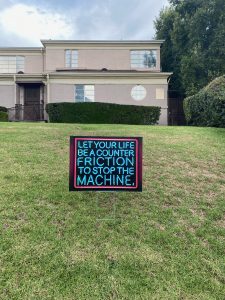
Patrick Martinez
Civil Disobedience (Thoreau), 2020
Digitally printed Coroplast sign
Open edition – $50
Signed edition of 5 artist proofs – $250
50% of proceeds will be shared with Border Kindness, which will go toward providing food, medical care and other emergency services to asylum-seekers returned to Mexico via Trump’s Migrant Protection Protocols.
The first artist to participate is Los Angeles-based Patrick Martinez, who has created a lawn sign featuring a quote from Henry David Thoreau’s essay, On The Duty of Civil Disobedience:
“If the injustice is part of the necessary friction of the machine of government, let it go, let it go; perchance it will wear smooth,— certainly the machine will wear out. If the injustice has a spring, or a pulley, or a rope, or a crank, exclusively for itself, then perhaps you may consider whether the remedy will not be worse than the evil; but if it is of such a nature that it requires you to be the agent of injustice to another, then, I say, break the law. Let your life be counter friction to stop the machine. What I have to do is to see, at any rate, that I do not lend myself to the wrong which I condemn.”
Martinez takes formal inspiration from the ubiquitous neon signs of his native LA, which populate the city’s strip malls. Instead of announcing a laundromat or pawn shop, Martinez’s neons make urgent statements that draw our attention to current issues of displacement, gentrification, and socio-economic inequalities. At a time of such social upheaval, we are invited to consider the role that we choose to have in the larger systemic injustices which abound.
Patrick Martinez, (b. 1980 Pasadena, CA) earned his BFA with honors from Art Center College of Design in 2005. His work has been exhibited domestically and internationally in Los Angeles, Mexico City, San Francisco, Minneapolis, Miami, New York, Seoul and the Netherlands, at venues including the Studio Museum in Harlem, the Smithsonian National Portrait Gallery, the Tucson Museum of Art, the Albright-Knox Art Gallery, the Cornell Fine Arts Museum, the Vincent Price Art Museum, the Museum of Latin American Art, LA Louver, Galerie Lelong & Co., MACLA, the Chinese American Museum and the Euphrat Museum of Art, among others. Patrick’s work resides in the permanent collections of LACMA, the Smithsonian National Museum of African American History and Culture, the Nerman Museum of Contemporary Art, the Crocker Art Museum, the Cornell Fine Art Museum, the Pizzuti Collection of the Columbus Museum of Art, and the Museum of Latin American Art, among others. Patrick was awarded a Rauschenberg Residency on Captiva Island, FL, to be completed in 2021. Also in 2021 Patrick will be the subject of a solo museum exhibition at the Tucson Museum of Art. Patrick lives and works in Los Angeles, CA and is represented by Charlie James Gallery.
Border Kindness is a nonprofit humanitarian organization that provides asylum-seekers, migrants, refugees, and the displaced with comprehensive services that include food, shelter, clothing, medical care and legal services. Border Kindess’ programs and interventions are designed to identify, protect and nurture the most vulnerable, including women, children, elderly and families. Proceeds from this edition will go toward providing food, medical care and other emergency services to asylum-seekers returned to Mexico via Trump’s Migrant Protection Protocols.
